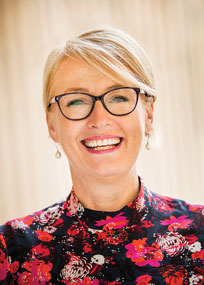With Covid changing the way Australians work forever, councils continue to adjust to the brave new world of flexible work, raising the question of whether WFH has been a failed experiment that’s caused more problems than it solved.

During a panel discussion on building a strong workforce at ALGA’s National General Assembly on Thursday, Melbourne’s Lord Mayor Sally Capp said the increased demand for remote work was creating challenges for Council.
The City has now adopted an ‘all-in’ approach, with most of its workforce now back in the office.
“The way we work has changed, we know that flexible working is here to stay,” Cr Capp said.
“In a recent study greater Melbourne was ranked second among peers for having the most flexible jobs available. This was held up as an accolade and it may be in the modern era, but I’m not so sure.
“The City of Melbourne has always been a flexible employer working with our staff around their needs, but increased demand for remote work is really creating challenges.”
She said half Council’s workforce is in place-based jobs where they need to turn up, while the other half could potentially work entirely remotely.
“We’ve asked ourselves the question, are we ‘all-in’ as a culture? Do we allow half our people to stay away but require the others to come in and face the public? Or are we all in?”
Another issue, Cr Capp said, is that Council is actively encouraging people back to city workplaces to support local businesses, and needs to lead by example.
Thirdly, face-to-face time – as opposed to Facetime – provided benefits for team leaders and fostered better learning, innovation and advancement.
A ‘winning formula’
However, fellow panellist Mayor Karen Veron from the Town of Victoria Park in WA reported a totally different experience.

“Our view has been the opposite of the ‘all-in’ of Melbourne,” she said.
Cr Vernon described workforce flexibility as a “winning formula”, that had been facilitated by techological advances put in place during Covid.
She says workforce flexibility has been key to attracting and retaining staff.
“What we’ve seen is that flexibility for our workforce is the key going forward to attract and retain them, and that means that some people will always be able to do a level of work from home if they want to,” she said.
Cr Vernon said Council staff were committed to the idea that employees should have a say in the sort of workplace they want and have a hand in deciding how they do their work.
“At the moment there’s been no loss of productivity, in fact there’s been an uptick in productivity, so for now that is working for us,” she said.
Cr Capp it didn’t really matter which path councils took in terms of flexible work, as long as resulted in benefits.
“Like most employers this is an ever-evolving story, It’s about daily conversations about this transformation,” she said.
“We know that the future of work will be different, we just want it to be a good different,” Cr Capp said.





The WFH vs office only is a journey that we really only started.
Boundaries, communication and competencies.
WFH fails when the these are out of balance. That could be true in the office or remotely.
Finding the balance depends on individual managers, councils’ recruitment and HR processes.
The failure point is where managing remote workers is seen by any party as leaving staff alone and for them to fend for themselves.
Productivity as a the lead measure can mask other issues. So good communications is essential to success.